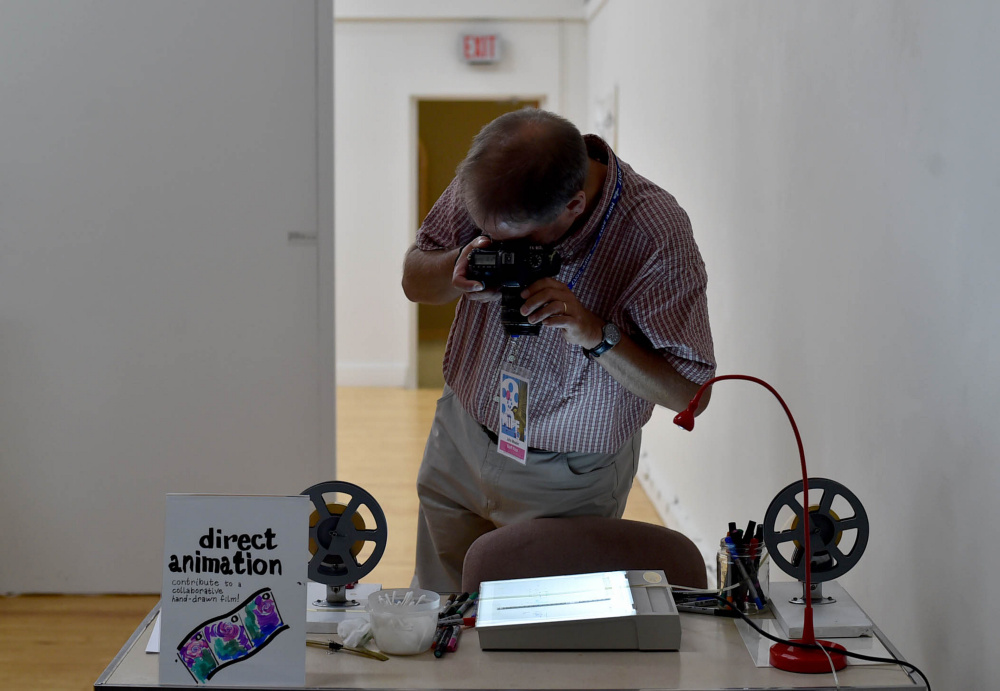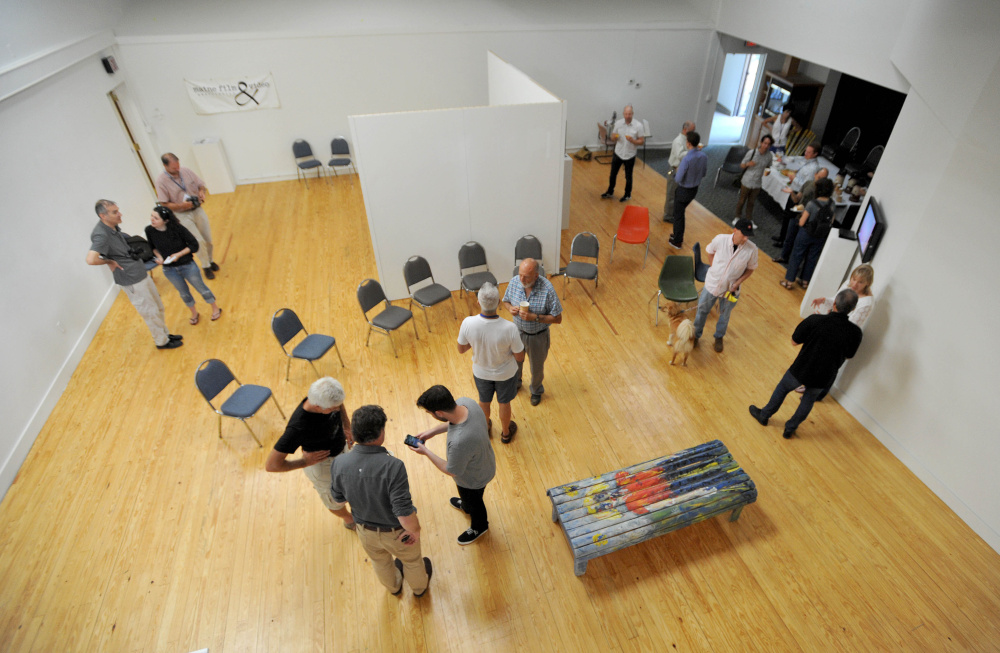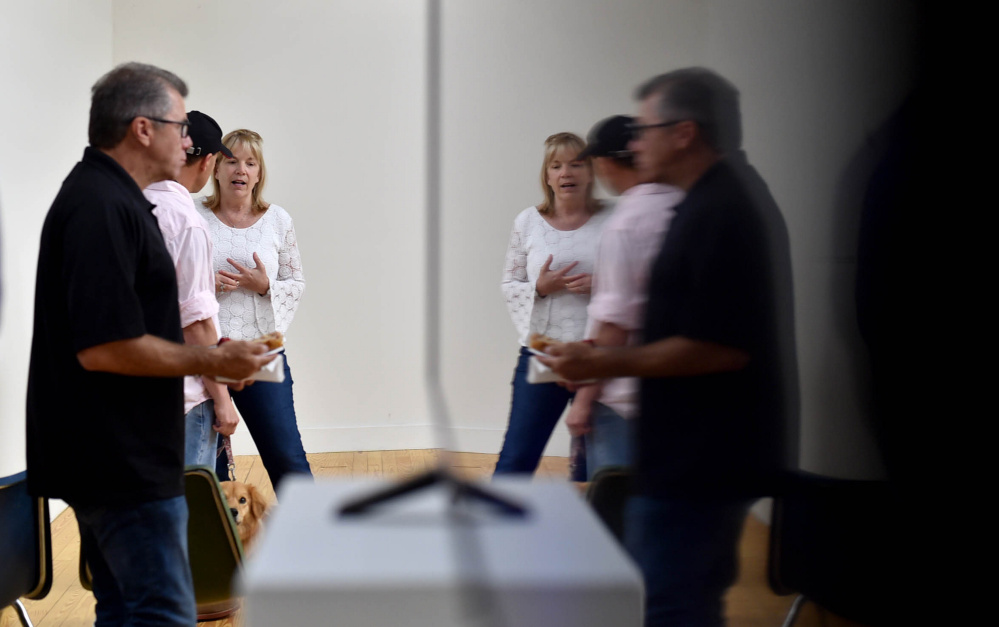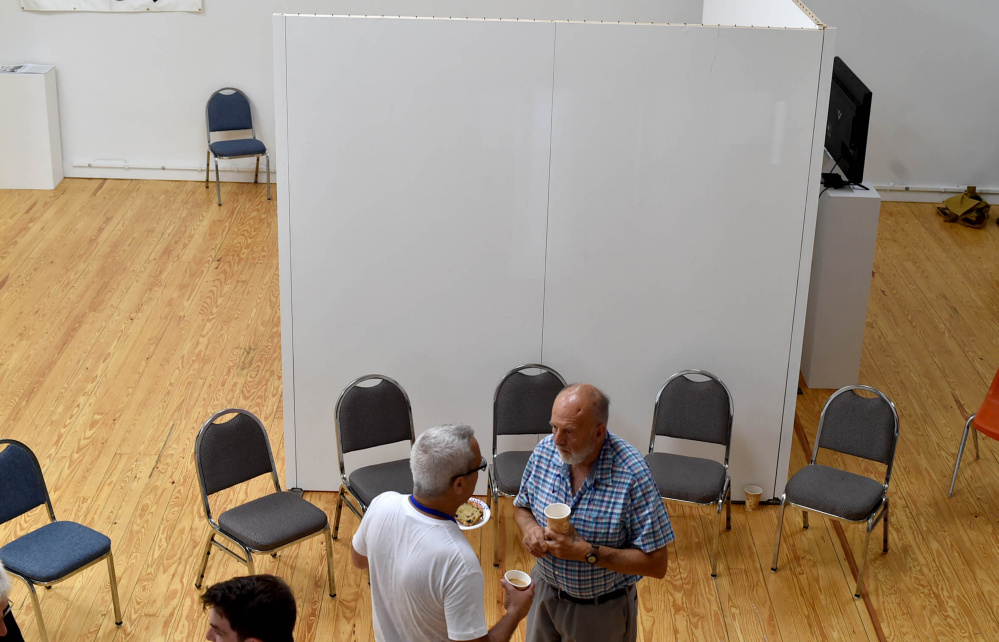WATERVILLE — Filmmakers and industry supporters came together Saturday for a networking meet-and-greet focused on growing and creating a more connected film industry in Maine.
The gathering was sponsored by the Maine International Film Festival, which continues its 20th-year run through Sunday. Attending the event were around 20 filmmakers and industry boosters from across the state, the country and the globe.
Some of those present had films screening at the festival, while others simply wished to meet their fellow cinephiles. All, however, spoke of their fondness for Waterville’s film festival and a desire to see a strong film industry take root in Maine.
Armenian writer and director Arshak Amirbekyan marked his second appearance at the festival with his film “Mariam’s Day Off,” the story of a prostitute who meets an artist who takes an interest in her beyond her day job.
Amirbekyan said he returned to MIFF gladly after screening at the festival in 2011. After attending festivals around the U.S. and in Canada, Amirbekyan said he found MIFF to be the most intimate and friendly as well as the most passionate about films.
“It’s kind of a celebration for film lovers by film lovers,” Amirbeykan said.
But some of those film lovers reported struggling to establish themselves or find enough work in Maine. They described a state full of talent and rich with picturesque locations that sometimes fly a little too far under the radar.
Mauricio Handler has worked for decades as a natural history cinematographer and photographer, shooting for National Geographic magazine for many years in stunning locales all over the world. Handler moved to Maine in 2005 after 25 years in the British Virgin Islands. While he loves the quiet and quality of life Maine offers, Handler said he needs to go out of state for much of his film work.
“We need to promote Maine,” Handler said. “We have the talent and we have all the equipment. We could shoot a feature film tomorrow from drones all the way to under the water.”
A board member of the Maine Film and Video Association, Handler believes the Legislature needs to create more incentives in its bid to attract film productions to the state and invest in broader marketing efforts for Maine talent.
Maine Film Office Director Karen Carberry Warhola said she has seen the Legislature consider bills to boost Maine’s film incentives in every session since she started in her position in 2012 but has yet to see a funded bill pass through into law.
Even without the additional incentives, Carberry Warhola argues it is relatively inexpensive to film in Maine, where companies don’t need to secure as many permits and permissions as in some other locations.
When she travels to festivals and industry events to promote Maine, Carberry Warhola said she focuses on marketing the state’s stunning locations and film-friendly communities.
“I hear from a lot of independent filmmakers that they can get lost in the shuffle,” Carberry Warhola said. “When they come here, they feel welcomed and supported by communities in Maine.”
Other Maine agencies are working to establish more diverse and efficient funding schemes than those provided through the annual legislative budget. Kerstin Gilg, media arts and performing arts director at the Maine Arts Commission, noted his office’s efforts to establish a nonprofit friends-of-the-arts group with more flexibility to fundraise and develop an endowment to support the arts in Maine.
“I think we really need to recognize the arts as a 21st-century industry that could really be developed in Maine,” Gilg said. “We still have a way to go.”
In its last funding cycle, Gilg said the commission had exhausted its grant budget after meeting only about 30 percent of the demand for funding. He said he hopes once the nonprofit takes shape it can start pursuing new funding avenues for the state’s artists.
“I’d love to see Maine be a conduit to the East Coast international arts,” Gilg said, pointing to Maine’s close ties to Canada and new opportunities opening with the Arctic. “I’d love to see that being developed in a more realized way.”
The day also saw a celebration of some of Maine’s youngest filmmakers. At the Maine Student Film & Video Festival, held at the Waterville Opera House, young filmmakers in grades seven through 12 were honored for their achievements in narrative, documentary and creative filmmaking.
At a screening and awards ceremony hosted by Maine Film Center board president Uri Lessing, audiences were treated to 12 films that ranged from the quirky to the surreal. The winner of the narrative category, “Classified,” tells the story of two boys who literally stumble across a mysterious USB drive while playing on the beach. The boys take the drive home and hack it with remarkable ease only to find it holds evidence of a U.S. government program on alien life. The film’s director, home-schooler Noah Anderson, said the film and cinematography, including a moving shot of the two boys biking on a dusty back road, which Anderson shot while riding on the back of his mother’s car, were inspired by the hit series “Stranger Things.”
Aliens make an appearance in another festival winner, Gardiner Area High School student Corey Boynton’s stop-motion and animated film, “Alien Roommate.” The nearly three-minute short tells the tale of an alien who answers an ad for a roommate, quickly makes himself at home, eating chips on his roommate’s couch, drilling into the roommate’s brain while he sleeps, throwing techno parties with local cows and stuffing the refrigerator with unpredictable and still living food items.
The winner of the documentary category spotlights the hands-on learning opportunities offered at the Mid-Maine Technical Center. In “Career Technical Education,” director Caitie Collier interviews future firefighters, filmmakers, teachers and medical personnel getting their first training for their dream careers.
Kate McCormick — 861-9218
kmccormick@centralmaine.com
Twitter: @KateRMcCormick
Send questions/comments to the editors.







Comments are no longer available on this story